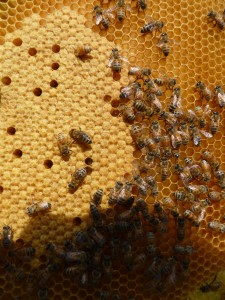Lugnasa Hiroshima Moon
Pope’s butler accused of theft. Wait. The pope has a butler? Shootings yesterday at Texas A&M. The Sikh Temple in Wisconsin last week. Aurora the 20th of July. Can anyone else hear a tear in the moral fabric of the universe?
Not to mention that yesterday the stock market was down because of news from Asia. Asia? What happened to the euro? It’s true that bad news always happens and good news is not, usually, news at all. Still.
Let’s throw in the news from Europe’s Cryosat that the polar ice has begun to retreat
(at) a loss of 900 cubic kilometers of ice in the last year. That’s 50 percent more than computer models predicted would melt.
A lack of ice is good news for shipping, and oil and gas exploration, but dark ocean water warms the air above more than reflective ice, a “positive feedback” that accelerates warming. Research suggests the Arctic is warming 2-4 times faster than the rest of the Northern Hemisphere. So what? This warming is nudging the jet stream north, to the tune of 1 mile a year, 18 feet/day. (paul douglas weatherblog)
Predictions of the end times have a 100% failure rating (so far), so I’m not going there, but bizarre times? Yes.
Of all of these, the news I understand least are the three shootings. Like the man here who killed his three daughters, there may be a psychological explanation. Certainly there is a psychological explanation. Has to be. But explanation does not serve. Tracing the inner path to these crimes leaves us with the crime in the end.
I’d like to know, if anybody does know, the incidence of these or similar crimes in other cultures. Are we truly aberrant or is it a statistical phenomenon, a law of large numbers reality?
Of all these, the news that worries me the most comes from the cryosat satellite. This summer was miserable for us and horrific for much of the country. In this case I understand the cause. I drive one. So do you. I use electricity. So do you. We have treated global warming as a topic for next year. For the next generation. Guess what?
It is next year. And we’re the next generation.


